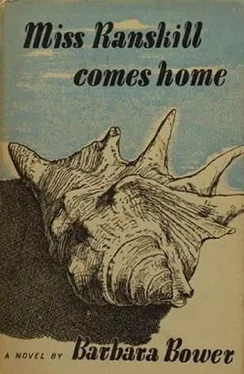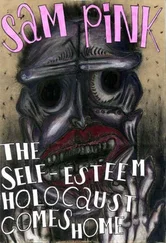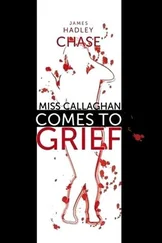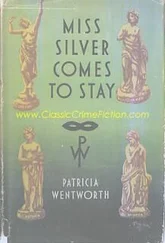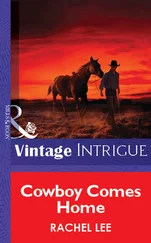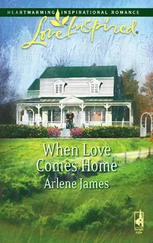‘Yesterday’s over. Listen, Colin, today’s finished too: it’s tomorrow that counts.’
He began to quieten slowly as he nuzzled into her shoulder and choked, ‘I didn’t have anything – nothing at all.’
‘Listen, and I’ll tell you a story.’ His fingers were gripping the lapel of her coat.
‘Once upon a time there was a man on an island. He was a carpenter, like you’re going to be, and he hadn’t anything either except his clothes and a jack-knife. And he wanted to build a boat – a big one. There were trees on the island, but there was no felled timber. It took him more than four years, but he made his boat and he made it seaworthy, so that I could come across the sea to England to look after you because he wasn’t able to come himself.’
Colin’s head jerked up for a moment.
‘Did you know him?’
‘Yes, and so did you.’
‘Not–’ the boy’s eyes pleaded queerly in the strange light, ‘not – it wasn’t my Dad?’
‘Yes, it was.’
‘But, my Dad’s dead.’
‘Yes,’ said Miss Ranskill, ‘yes, but he made the boat first.’
The boy’s eyes were hazy with sleep and weeping. His hand groped for the shell. Miss Ranskill gave it to him and settled him into his corner. He gave a little whimpering sound and fell asleep, his fingers twitching on the shell. He handled it as his father would have handled it.
Nothing of him that doth fade, but doth suffer a sea-change into something rich and strange.
The engine took up the refrain Into something rich and strange, rich and strange, rich and strange. Yesterday’s over, yesterday’s over, yesterday’s over. A re-eed shaken with the wind, a re-eed shaken with the wind.
Yesterday was over for Miss Ranskill too.
The island was still there, but she did not need it any longer. This other island needed her more. There was so much to be done, so much to be restored to compensate for what had been destroyed.
The Carpenter was not really dead: he was alive in his boy and she could share in that immortality.
Her mind was harking forward, away from the island and into a garden, forward to a spring morning, to a thrush whistling on a walnut tree and a boy whistling in a woodshed, to a liver-and-white spaniel, very fat and very kind, waddling beside a perambulator, to Lucy’s voice repeating, ‘What’s the use of killing if you aren’t giving anything back?’
The engine was hurrying now and Miss Ranskill’s thoughts speeded with it.
The train stopped with a jerk, and Colin opened his eyes.
Then the carriage door was opened and a porter bawled ‘Lynchurch! Lynchurch!’
‘We’re home now, Colin.’
He blinked sleepily and smiled at her as he tucked the sea-shell into his pocket.
Miss Ranskill had come to the end of her journey.
AFTERWORD

In the autumn of 1946, the novelist Rosamond Lehmann, then at the peak of her literary career, was commissioned to write fiction reviews for The Listener . Her judgments were perceptive: she gave high praise, for instance, to Albert Camus’s The Outsider , which was not then recognised by other critics as the modern classic it has become. I came across these reviews while researching for my forthcoming book on Lehmann’s own literary reception, and was intrigued by her warm commendation of a novel which I discovered to have been long out of print, and whose author, named as Barbara Bower, was unknown to me. Miss Ranskill Comes Home , Lehmann said, ‘is a work of great originality, and delightfully readable, a blend of fantasy, satire and romantic comedy’. I was able to find a copy in the British Library, and having read and enjoyed it, I contacted Persephone, and this republication is the result.
Rosamond Lehmann was not alone in her appreciation of the novel, as I was to find out. J D Beresford, in the Manchester Guardian , congratulated Miss Bower on ‘a witty first novel which besides being continuously entertaining displays a fine appreciation of life’s values’. The book also received an enthusiastic reception in America, despite transatlantic readers’ lack of experience of the wartime shortages, black-out and other restrictions, which are an integral feature of the plot. Sara Henderson Hay in the Saturday Review of Literature said that the novel was ‘somber, satiric, often bitter, a mixture of realism and romanticism’, and that it ‘approaches a modern morality play; it is an idea, an allegory in a way in which fantasy is blended with fact for the purpose of the whole’. Anne Richards in the New York Times also praised the blend of ‘reality and fantasy, irony and pity’.
The novel received an unprecedented accolade from one of America’s most influential popular journals, the Saturday Evening Post . At that time that magazine’s fiction section consisted of short stories, serialised (and almost always abridged) novels, and condensed novels, contained within one issue, and labelled ‘Novelettes’ but evidently not with any pejorative meaning. For instance, one such novelette was H E Bates’s acclaimed The Cruise of the Breadwinner , rightly described by the Post as ‘a distinguished war story’. In the case of Miss Ranskill Comes Home , however, they announced that, since they felt it to be ‘one of the finest stories we have read in a long time’, they would publish it neither in instalments nor as a Novelette, but in full ‘in three long parts, each about three times the length of a typical Post serial installment’.
So who, I wondered, was Barbara Bower, and why, despite her book having been so well received, did she only seem to have written one novel? The answer partly lay in the fact that Bower was the author’s married surname; her full maiden name was Barbara Euphan Todd, the name under which for some twenty years previously she had enjoyed considerable success as a children’s writer, most famously as the creator of the talking scarecrow of Scatterbrook Farm, Worzel Gummidge, and his friends.
The only child of a country parson, Barbara Euphan Todd was educated, as she later put it, ‘very slightly’ by daily governesses until she was sent to boarding school at the age of 14. She appears to have been somewhat coy about her date of birth; reference books cite the year as being ‘1890 (?)’. During the First World War, she worked on the land, and as a VAD nurse. After the war, she returned to her parents’ home, and began to write, first collaborating with various others on collections of fairy stories, and then writing her own realist adventure novels appealing to slightly older children. Her first attempt to combine the worlds of fantasy and real life adventure in the shape of Worzel Gummidge was however rejected by several publishers, and the manuscript was put away in a drawer for a number of years.
Later Barbara had poems and short fiction for adults published in Cornhill Magazine , and regularly reviewed books for Punch , which, even at the modest rate of £2. 12s. 6d. per contribution, provided a steady income. By strange coincidence, in 1936, she was among the critics who disliked Rosamond Lehmann’s The Weather in the Streets . The heroine, Olivia, irritated her, and so, she continued, ‘does her creator, who seems to show an almost old-fashioned determination to shock’. While admitting that the book was clever and interesting, she nonetheless wished that Lehmann, ‘who can write so beautifully about beautiful things, would not bother to write so badly about ugly ones’. It should not be thought, however, that in praising Miss Ranskill , Lehmann was being remarkably forgiving ten years later: she was unlikely to have known the name of the reviewer, Punch reviews then being unsigned.
Читать дальше
